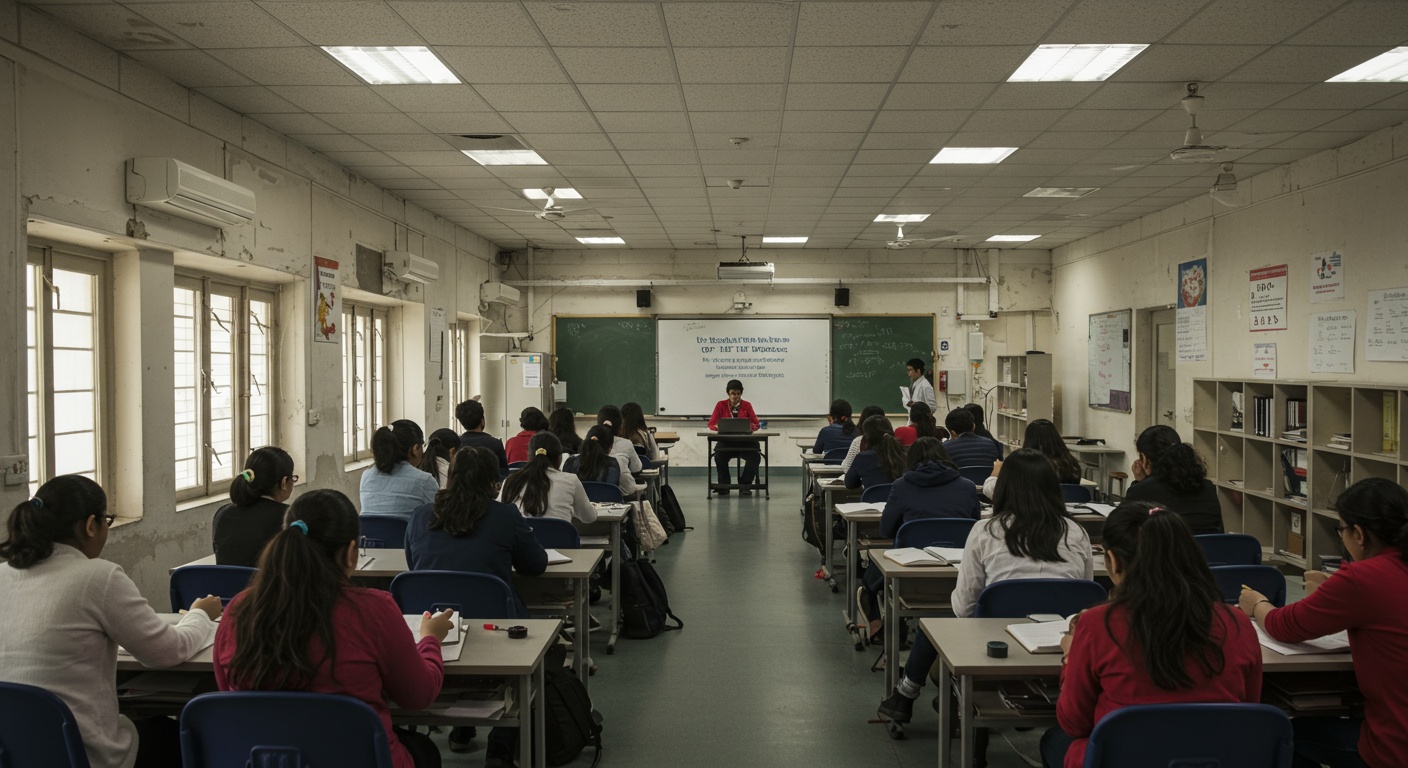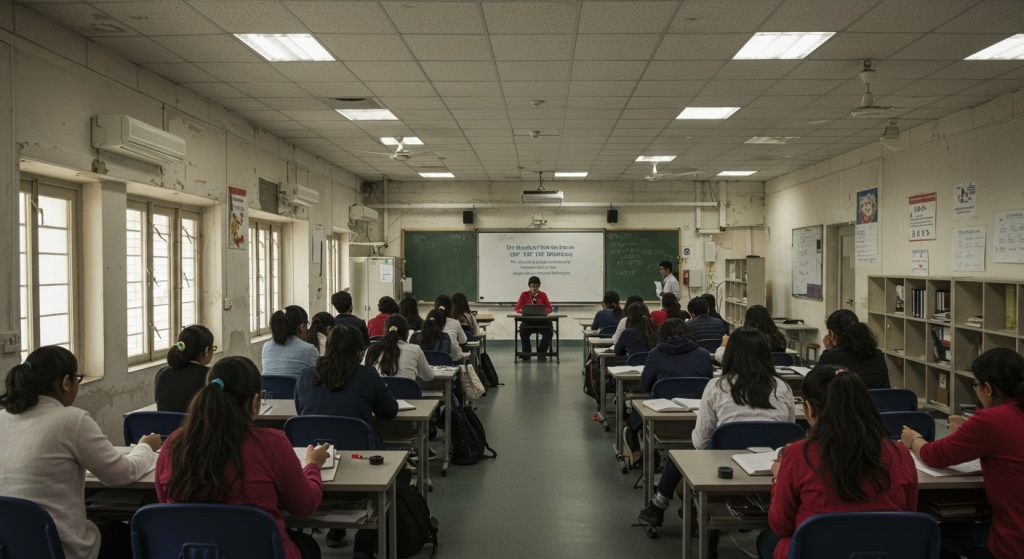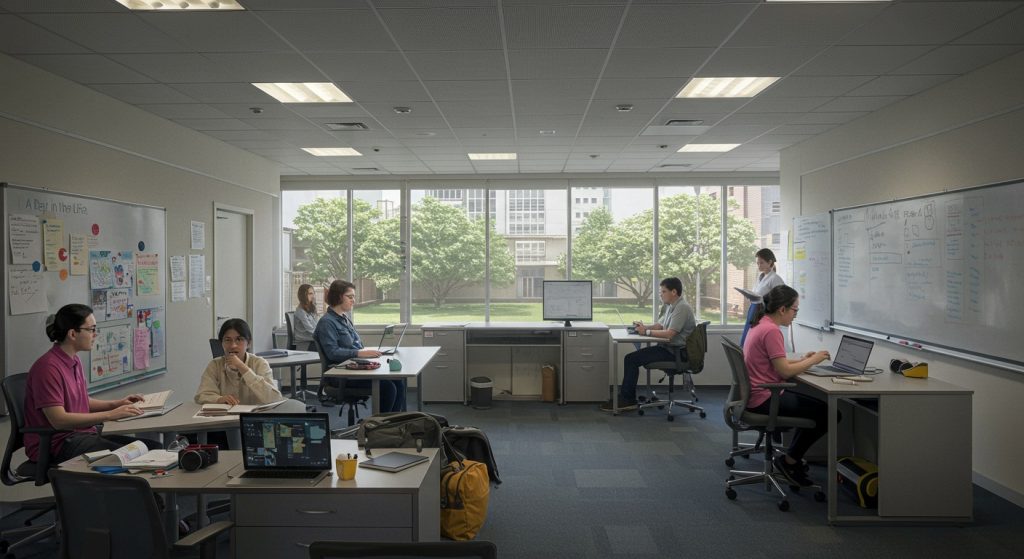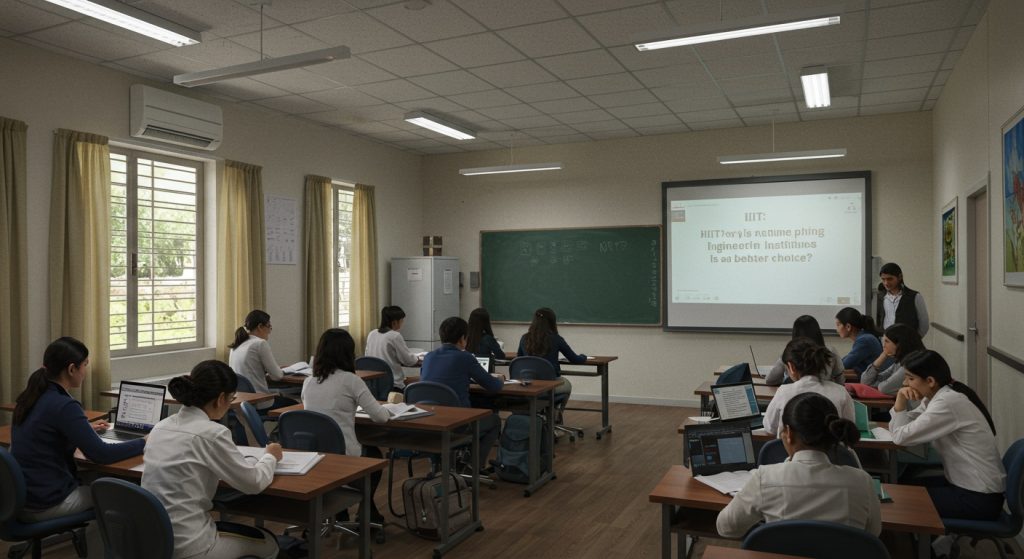Navigating the prestigious Indian Institutes of Technology presents a pivotal decision: selecting the optimal engineering branch. While Computer Science consistently commands top preference, driven by the explosive growth in AI, Machine Learning. Data analytics, the landscape rapidly evolves. Emerging interdisciplinary fields now blur traditional lines, enhancing prospects in Electrical Engineering through IoT and embedded systems, or in Mechanical Engineering with robotics and advanced manufacturing. Understanding the true value of each branch extends beyond initial JEE ranks, encompassing curriculum depth, research opportunities. Long-term industry relevance in a rapidly digitizing global economy.

Understanding the IIT Landscape: A Gateway to Excellence
The Indian Institutes of Technology (IITs) stand as beacons of higher education and technological innovation in India. Established as institutions of national importance, they are renowned globally for their rigorous academic curriculum, cutting-edge research. Producing world-class engineers, scientists. Entrepreneurs. Gaining admission to an IIT is a highly competitive endeavor. For good reason: the “IIT tag” often opens doors to unparalleled career opportunities, both within India and internationally.
When prospective students consider joining the Top IITs, a crucial decision they face is choosing a specific engineering branch. This choice significantly influences their academic journey, skill development. Future career trajectory. Each branch offers a unique set of challenges and opportunities, catering to different interests and aptitudes. Understanding the core disciplines and their real-world applications is key to making an informed decision.
Factors Influencing Branch Rankings and Perception
While all branches at the Top IITs are academically robust, their “ranking” or popularity often fluctuates based on several factors. It’s vital to grasp that there isn’t an official, universally agreed-upon ranking of branches. Rather a perceived hierarchy driven by student demand, industry trends. Historical placement data. Here are the key factors:
- Placement Statistics
- Industry Demand
- Research Opportunities & Faculty Expertise
- Interdisciplinary Scope
- Perceived Glamour & Innovation
- Historical Reputation
This is often the most significant driver. Branches with higher average salaries and a greater number of job offers from top-tier companies (especially in tech and finance) tend to be perceived as more desirable.
The current and projected needs of the global job market play a huge role. For instance, the boom in IT and AI has propelled Computer Science to the forefront.
Branches with active research groups, pioneering faculty. Strong industry collaborations offer exciting avenues for advanced studies and innovation.
Branches that allow for easy transition into other fields or offer a broad skill set are often highly valued.
Some fields, like AI or robotics, are seen as more “futuristic” or “glamorous,” attracting a large pool of talented students.
Certain branches have historically maintained a strong reputation due to their foundational importance and consistent output of successful alumni.
The Perennial King: Computer Science and Engineering (CSE)
Without a doubt, Computer Science and Engineering (CSE) consistently ranks as the most sought-after branch across all Top IITs. This popularity is driven by the unparalleled career opportunities in the global tech industry, high compensation packages. The dynamic nature of the field.
- Curriculum Overview
- Why it’s Highly Sought After
- Career Prospects
- Software Developer/Engineer
- Data Scientist/Analyst
- Machine Learning Engineer
- AI Researcher
- Cybersecurity Analyst
- Cloud Engineer
- Product Manager
- Entrepreneur
- Real-world Application
CSE encompasses a vast array of topics, including data structures and algorithms, operating systems, computer networks, database management systems, artificial intelligence (AI), machine learning (ML), software engineering, cybersecurity. Computer graphics. Students learn to design, develop. Maintain software systems, manage complex data. Innovate new computational solutions.
The demand for skilled software engineers, data scientists. AI/ML specialists far outstrips supply. Companies like Google, Microsoft, Amazon, Meta. Various startups aggressively recruit CSE graduates from the Top IITs. The branch also offers significant entrepreneurial avenues, with numerous IIT CSE alumni founding successful tech companies. For instance, the founders of Flipkart (Sachin Bansal and Binny Bansal) are IIT Delhi CSE alumni, demonstrating the entrepreneurial spirit fostered within this discipline.
Consider the development of self-driving cars. This cutting-edge technology heavily relies on CSE principles like computer vision (for object detection), machine learning (for decision-making). Robust software engineering (for system reliability and safety). A CSE graduate from IIT Bombay might find themselves working on the core algorithms that power these vehicles.
The Ever-Evolving Core: Electrical Engineering (EE)
Electrical Engineering (EE) is another foundational branch that consistently ranks among the top choices. It offers a broad spectrum of opportunities, often overlapping with CSE and ECE, making its graduates highly versatile.
- Scope
- Interdisciplinary Nature
- Career Prospects
- Chip Design Engineer (VLSI)
- Embedded Systems Engineer
- Power Systems Engineer
- Telecommunications Engineer
- Control Systems Engineer
- Signal Processing Engineer
- Hardware Architect
- Research & Development
- Real-world Application
EE deals with the study and application of electricity, electronics. Electromagnetism. Its sub-disciplines include power systems, control systems, signal processing, microelectronics, telecommunications. Embedded systems.
Many EE graduates seamlessly transition into software roles due to their strong analytical and problem-solving skills, coupled with courses in programming and digital signal processing. For example, understanding how a mobile phone’s processor works (microelectronics, a core EE domain) is crucial for developing efficient software applications for it.
Think about the smart grid initiatives globally. Electrical engineers are at the forefront of designing and implementing these intelligent power distribution systems, optimizing energy usage. Integrating renewable energy sources. Or consider the design of the latest smartphone chips – this is primarily the domain of EE, specifically microelectronics and VLSI (Very Large Scale Integration) design.
The Foundation of Innovation: Mechanical Engineering (ME)
Mechanical Engineering (ME) is one of the oldest and broadest engineering disciplines. While sometimes perceived as “traditional,” modern ME has evolved significantly, incorporating advanced technologies like robotics, AI. Data science.
- Traditional vs. Modern ME
- Career Prospects
- Automotive Engineer
- Aerospace Engineer
- Manufacturing Engineer
- Robotics Engineer
- HVAC Engineer
- R&D Engineer
- Energy Systems Engineer
- Design Engineer
- Real-world Application
Traditionally, ME focused on thermodynamics, mechanics, kinematics. Materials science. Today, the field extensively uses computational tools (CAD/CAM, FEA), integrates robotics and mechatronics. Delves into areas like additive manufacturing (3D printing), sustainable energy systems. Biomechanics.
A great example is the design and production of electric vehicles (EVs). While software is crucial, mechanical engineers design the vehicle’s structure, cooling systems for batteries, efficient powertrains. Even the robotic assembly lines that build them. An IIT Kanpur Mechanical Engineering alumnus might be working on optimizing the aerodynamics of the next generation of electric cars or designing advanced manufacturing processes.
Bridging the Gap: Electronics & Communication Engineering (ECE)
Electronics & Communication Engineering (ECE) often stands alongside EE and CSE in terms of popularity, especially in Top IITs. It focuses specifically on electronic circuits, communication systems. Signal processing.
- Overlap with EE and CSE
- Focus Areas
- Career Prospects
- Semiconductor Engineer (Chip design, fabrication)
- Telecommunication Engineer
- Embedded Systems Developer
- RF Engineer
- Network Engineer
- Consumer Electronics Designer
- Signal Processing Engineer
- VLSI Design Engineer
- Real-world Application
ECE shares a significant portion of its curriculum with EE, particularly in microelectronics and signal processing. It also overlaps with CSE in areas like embedded systems and computer architecture, as communication systems increasingly rely on sophisticated software.
ECE students specialize in areas like VLSI design (the backbone of all modern electronics), wireless communication (5G, IoT), optical communication, digital signal processing. Integrated circuits.
Every time you make a video call or stream content, you’re leveraging technologies designed by ECE engineers. From the chips in your smartphone that process signals to the network infrastructure that transmits data, ECE plays a pivotal role. The development of advanced 5G communication systems, for instance, is a core ECE domain.
The Workhorses: Civil Engineering (CE) & Chemical Engineering (ChE)
While perhaps not always in the top tier of student demand compared to CSE or EE, Civil and Chemical Engineering are vital branches that form the backbone of modern society and industry. They offer stable and impactful career paths.
Civil Engineering (CE)
- Focus
- Career Prospects
- Structural Engineer
- Transportation Engineer
- Environmental Engineer
- Geotechnical Engineer
- Construction Manager
- Urban Planner
- Project Manager (Infrastructure)
- Real-world Application
Civil Engineering deals with the design, construction. Maintenance of the physical and naturally built environment. This includes infrastructure such as roads, bridges, canals, dams, airports, sewerage systems, pipelines. Buildings. Modern CE also incorporates aspects of urban planning, environmental engineering. Smart city development.
Think of the extensive metro rail networks being built in major Indian cities or large-scale smart city projects. Civil engineers from Top IITs are instrumental in every stage, from planning and design to execution and maintenance, ensuring structural integrity, sustainability. Efficient resource utilization.
Chemical Engineering (ChE)
- Focus
- Career Prospects
- Process Engineer
- R&D Scientist (Pharmaceuticals, Materials)
- Environmental Engineer
- Petroleum Engineer
- Quality Control Engineer
- Biotechnology Engineer
- Nanotechnology Specialist
- Real-world Application
Chemical Engineering applies principles of chemistry, physics, biology. Math to design, operate. Optimize processes that transform raw materials into valuable products. This spans industries from petroleum and pharmaceuticals to food processing, materials science. Environmental protection.
Consider the development of new vaccines or the sustainable production of fuels. Chemical engineers from IIT Bombay or IIT Madras are crucial in designing the large-scale processes to manufacture these products efficiently, safely. With minimal environmental impact. They work on optimizing reactions, separating components. Ensuring product purity.
Emerging and Niche Branches: Future-Forward Options
Beyond the traditional branches, Top IITs are increasingly offering specialized and interdisciplinary programs that cater to emerging industry needs and research frontiers. These might not have the same breadth of opportunities as CSE. They offer highly focused and impactful careers.
- Data Science/AI (e. G. , IIT Hyderabad, IIT Madras)
- Aerospace Engineering (e. G. , IIT Bombay, IIT Kanpur)
- Engineering Physics (e. G. , IIT Delhi, IIT Bombay)
- Materials Science and Engineering (e. G. , IIT Bombay, IIT Kanpur)
- Biomedical Engineering (e. G. , IIT Bombay, IIT Delhi)
Some IITs now offer dedicated B. Tech programs in Data Science or Artificial Intelligence. These are highly specialized, focusing purely on the mathematical, statistical. Computational aspects of data analysis, machine learning. AI application development. Given the current global demand, these are extremely future-proof.
A niche but impactful field focused on the design, construction. Science of aircraft and spacecraft. Graduates find opportunities in organizations like ISRO, DRDO, HAL. Global aerospace companies like Boeing or Airbus.
This branch provides a strong foundation in fundamental physics and its engineering applications. It’s often a stepping stone to research in advanced materials, quantum computing, nanotechnology, or even finance due to strong analytical skills.
Crucial for developing new materials with enhanced properties for various applications, from aerospace and biomedical devices to electronics and sustainable energy.
Combines engineering principles with biology and medicine to design medical devices, diagnostic tools. Therapeutic solutions.
Beyond the Branch: What Truly Matters at Top IITs
While the choice of branch is significant, it’s crucial to comprehend that the “IIT tag” itself provides immense value, irrespective of the specific discipline. The holistic environment, peer group. Opportunities at the Top IITs often empower students to transcend their initial branch choice.
- Personal Interest is Paramount
- Interdisciplinary Learning & Minors
- The “IIT Tag” and Network
- Flexibility in Career Paths
- Projects, Internships. Research
Chasing a “top” branch solely for perceived placements without genuine interest can lead to dissatisfaction. Students who are passionate about their field tend to excel and find fulfilling careers, even in less “glamorous” branches.
Many IITs allow students to pursue minors or electives in other departments. An Electrical Engineering student, for example, can take numerous CSE courses, projects. Even a minor in Data Science, making them equally competitive for software roles.
The brand value of IITs is immense. Employers recognize the rigorous selection process and the quality of education. The alumni network is incredibly strong, providing mentorship, job opportunities. Entrepreneurial support. As a former IITian once told me, “The branch opens the first door. Your skills and network open all the subsequent ones.”
It’s a common misconception that a specific branch rigidly defines your career. Many graduates from Electrical, Electronics, Mechanical, or even Chemical Engineering branches successfully transition into IT, consulting, finance, or management roles through their acquired skills, internships. Postgraduate studies. For instance, a significant number of hires at leading tech firms are often from non-CSE branches at the Top IITs who have demonstrated strong coding skills and problem-solving abilities.
What you do during your four years matters more than just your branch. Actively engaging in projects, securing impactful internships, participating in research. Building a strong network are critical for career success.
Making Your Decision: Actionable Takeaways
Choosing an engineering branch at an IIT is a pivotal decision. Here are some actionable steps to help you make an informed choice:
- Research Curricula Thoroughly
- Talk to Current Students and Alumni
- Consider Future Industry Trends
- Assess Your Aptitude and Interest
- Don’t Solely Chase “Placements”
- Keep an Open Mind
Don’t just look at branch names. Dive deep into the detailed course structures of each branch at the specific IITs you are considering. Are there courses that genuinely excite you?
Reach out to students currently studying in different branches at the Top IITs. They can provide invaluable insights into the daily academic life, challenges. Opportunities within each discipline. Many IITs have active student communities on social media or forums where you can connect.
While immediate placements are crucial, think about the long-term trajectory of industries. Fields like AI, sustainable energy, biotechnology. Advanced materials are poised for significant growth.
Be honest with yourself. Are you more inclined towards abstract problem-solving and logic (CSE)? Do you enjoy hands-on design and physical systems (ME)? Are you fascinated by the fundamental workings of electricity and signals (EE/ECE)? Or are you passionate about building infrastructure (CE) or transforming raw materials (ChE)?
While attractive, high packages in the short term might not guarantee long-term career satisfaction. A branch that aligns with your passion will likely lead to greater fulfillment and sustained success.
Remember the flexibility offered by the IIT system. Even if you don’t get your absolute top choice, you can leverage the interdisciplinary nature of the programs and extracurricular opportunities to pivot towards your desired career path.
Conclusion
This guide has unveiled the dynamic landscape of IIT branches, from the perennially popular Computer Science Engineering to the evolving core disciplines. Remember, choosing your path is not merely about chasing the highest rank; it’s about aligning your intrinsic interests with future career prospects. For instance, while AI and Data Science are booming, leading to a surge in demand for specialized CSE roles, fields like Chemical Engineering are experiencing a renaissance through sustainable energy and biotechnology applications. Similarly, Civil Engineering is transforming with smart infrastructure and urban planning innovations. Your actionable next step is simple yet profound: introspect. Beyond the allure of high starting salaries, consider where your true passion lies. I’ve personally witnessed how students who deeply connect with their chosen field, even a less ‘trendy’ one, often achieve more profound and lasting success than those who solely follow the crowd. The industry is constantly evolving; yesterday’s top trend might be today’s foundational skill. Therefore, actively explore emerging interdisciplinary areas and consider how your chosen branch can adapt. Embrace continuous learning and remember that the IIT tag, combined with your dedication, will open doors regardless of the specific branch. Your journey through an IIT isn’t just about a degree; it’s about cultivating a mindset for innovation and problem-solving that will define your unique contribution to the world.
More Articles
Top Engineering Universities in France: A Comprehensive Guide for 2025
Best UK Universities For Artificial Intelligence Research In 2025
International Students: Application Checklist for Top UK Universities
Funding Your Postgraduate Studies in the UK: A Comprehensive Guide
FAQs
What are considered the absolute best branches at the IITs right now?
Generally, Computer Science (CS) and Electrical Engineering (EE) are consistently ranked at the top due to high demand, excellent placement records. Strong future growth prospects. Electronics & Communication (EC) is also highly sought after. Depending on the specific IIT, traditional branches like Mechanical Engineering (ME), Chemical Engineering (ChE). Civil Engineering (CE) can also be top-tier, especially at older, well-established campuses, offering diverse and stable career paths.
How exactly are these IIT branches ranked or perceived as ‘top’?
Their ‘top’ status is primarily determined by several factors: student demand (reflected in high cut-off ranks for admission), average placement salaries and the quality of companies recruiting, research output and faculty expertise in that domain. The overall industry relevance and future scope of the field. The perceived prestige often follows these tangible metrics.
What kind of job opportunities can someone expect after studying in these top branches?
Graduates from Computer Science and related branches typically find roles in software development, data science, AI/ML engineering, cybersecurity. Product management. Electrical and Electronics engineers are sought after in core electronics, VLSI design, telecommunications, power systems. Embedded systems. Mechanical engineers often pursue careers in automotive, manufacturing, robotics, aerospace. Energy sectors. Many also venture into consulting, finance, or entrepreneurship, leveraging their problem-solving skills.
Is Computer Science always the best choice, or are there other strong options worth considering?
While Computer Science often leads to very high starting salaries and abundant opportunities, ‘best’ is subjective. Electrical, Electronics. Mechanical Engineering are incredibly strong fields with vast innovation potential and stable career paths. Your personal interest and aptitude are crucial. A student genuinely passionate about robotics (Mechanical/Electrical) or chip design (Electronics) might find greater success and satisfaction in those fields than in a CS role they’re not passionate about.
Does the specific IIT matter as much as the branch choice for my career?
Both matter significantly. A top branch from an older, well-established IIT (like IIT Bombay or Delhi) often provides the best combination of peer group, faculty. Placement opportunities. But, a less ‘popular’ branch from a premier IIT might still offer better prospects and a stronger foundation than a highly sought-after branch from a brand-new IIT. It’s often a balance. The reputation and resources of the specific IIT campus play a big role.
What should I really think about when picking an IIT branch?
Beyond just rankings and cut-offs, consider your genuine interests and strengths. Do you enjoy coding, designing circuits, building machines, or understanding chemical processes? Research the curriculum, faculty expertise. Available research opportunities for each branch at different IITs. Think about your long-term career aspirations and whether the branch aligns with them. Don’t just follow the crowd; choose what excites you.
Do these highly-ranked branches automatically guarantee a high salary after graduation?
While these branches generally lead to higher average salaries and better placement opportunities compared to others, a high salary is never truly ‘guaranteed.’ Your individual performance, the skills you develop beyond the curriculum, internships, networking. Interview performance are all critical factors. The branch provides a strong foundation and opens doors. Your personal effort and capabilities ultimately determine your career trajectory and compensation.



